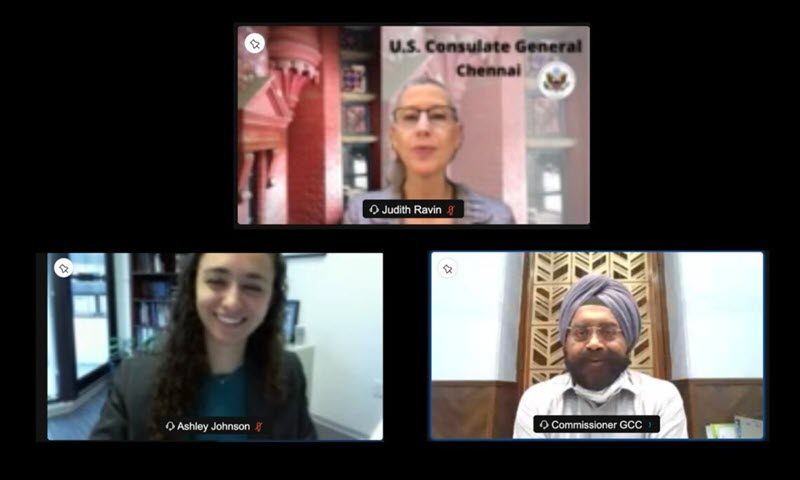Contact
Nontraditional Security Challenges in South Asia
Improving Disaster Management Cooperation
On September 8 and 9, 2021, NBR held its culminating workshop, “Nontraditional Security Challenges in South Asia: Improving Disaster Management Cooperation.” With the help of colleagues at the U.S. Consulate in Chennai, NBR gathered high-level disaster-management experts alongside stakeholders from the policy, public health, energy, and technology sectors. Consul General Judith Ravin began the event, which featured a keynote address from Gagandeep Singh Bedi, Principal Secretary and Commissioner of the Greater Chennai Corporation. Over the course of two days, the panel discussions covered all four phases of disaster management, incorporating views from academia, government, and NGOs across South Asia and the Indo-Pacific.
Participants and panelists highlighted the importance of communication, speed, and flexibility when responding to disasters, and emphasized the role of local communities when implementing recovery efforts. Attendees acknowledged the need to shift thinking away from purely reactive policies to proactive ones, avoiding the worst impacts of disasters before they happen.
Speakers stressed the importance of planning different priorities in the short and longer term, while using cost-benefit analysis to prioritize key issues in the aftermath of disasters. The discussion concluded with a call to include everyone at all levels of society in the disaster management process.
Day One ⯁ September 8
WELCOME AND INTRODUCTION
Consul General Judith Ravin, U.S. Consulate General Chennai
KEYNOTE ADDRESS
Gagandeep Singh Bedi, Principal Secretary and Commissioner, Chennai Corporation, Government of Tamil Nadu
THE FIRST HOURS DISASTER RESPONSE
When a disaster strikes, the first 24 hours are of critical importance. How nations respond in the immediate aftermath of catastrophe is often the most present and personal manifestation of the disaster management process. The normal operations of society, such as communications, transit, electricity, and healthcare, are often brought to a halt, and the preservation of life takes precedence during this crucial phase. This panel discussed existing efforts to coordinate humanitarian assistance and disaster relief efforts in South Asia, what aspects can be improved, and how to avoid the worst problems in disaster response before a disaster strikes.
Moderator
Ashley Johnson, The National Bureau of Asian Research
Panelists
Alistair David Cook, RSIS, Nanyang Technological University
Sarabjeet Parmar, National Maritime Foundation
ASSESSING THE DAMAGE: DISASTER RECOVERY
Rebuilding after a large disaster, where all aspects of society are affected, is a long and difficult process. This phase includes efforts to reinstate basic functions of society, while also offering opportunities to reduce vulnerability to future disasters. In addition to physically rebuilding infrastructure, recovery efforts include addressing health concerns over stress-related illnesses or secondary disease outbreaks and reviving the economy after homes, assets, and livelihoods have been destroyed. This panel discussed how to best coordinate efforts in disaster recovery, how existing development plans could be leveraged, and the role for international cooperation when communities must make long-term investments into rebuilding.
Moderator
Thomas Lutken, The National Bureau of Asian Research
Panelists
Manu Gupta, SEEDS-India
Mohammad Mahmodul Hasan, Christian Commission for Development in Bangladesh
Day Two ⯁ September 9
WELCOME AND OVERVIEW
Thomas Lutken, The National Bureau of Asian Research
SOFTENING THE BLOW: DISASTER MITIGATION
This panel represented the shift to the longer-term, strategic phases of disaster management, working to prevent the worst effects of disasters long before they strike. Mitigation efforts aim to avoid the effects of a disaster altogether by removing vulnerable infrastructure from flood-prone areas or ensuring multiple redundancies in lines of communication. These raise governance issues, such as how to implement stricter safety codes or build flood prevention systems, that are often linked to questions about the political economy. As weather patterns shift and the frequency of some disasters increases, how can governments in South Asia better prepare for the effects of climate change through their mitigation effort? And how can cooperation between regional and other international partners help avoid the impacts
of natural disasters?
Moderator
Ambassador Tariq Karim, Independent University, Bangladesh
Panelists
Deepa Srinivasan, Vision Planning and Consulting
Pushp Bajaj, National Maritime Foundation
PLANNING AND RESILIENCE: DISASTER PREPARATION
The final panel covered preparation, where planners seek to train critical personnel and build institutional capacity to deal with a disaster when it strikes. Mock disaster-response drills, cooperative plans between countries or communities, and evacuation exercises are necessary parts of disaster preparation that are often overlooked in the long gaps between major catastrophes. This panel explored the best practices for stakeholders and communities to prepare for the impacts of disasters that cannot be avoided. While South Asia has international mechanisms for cooperation, geopolitical concerns can stifle their effectiveness. The panel considered how subnational cooperation or NGOs might help fill this gap, as well as how disagreements over data sharing can be overcome to facilitate better planning in an ever more data-driven world.
Moderator
Nilanthi Samaranayake, CNA
Panelists
Akriti Vasudeva, The Stimson Center
Takako Izumi, Tohoku University
Sohini Bose, Observer Research Foundation
DISCUSSION AND BREAKOUT SESSIONS
Download the full agenda with bios here.




